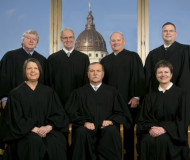6/18/2019
Kansas Supreme Court Rejects Damage Limits In Traffic Injury CaseKansas Supreme Court rejects legislative limit on pain and suffering damage awards set by juries in car accident cases.

The Kansas legislature does not have the authority to limit the constitutional power of juries to award monetary compensation for pain and suffering in car accident cases. A majority of state Supreme Court justices on Friday decided to restore the full amount a jury awarded to Diana K. Hilburn, a motorist who suffered severe injuries in a rear end collision nine years ago.
At the time of the accident, Hilburn had been recovering from lumbar fusion surgery. Her husband was driving her home after picking up a prescription from a pharmacy in Witchita when heavy traffic piled up on the road ahead. They slowed to a crawl, but a big rig truck driver behind them was not paying attention. The truck slammed into Hilburn's car, and the impact loosened the medical hardware in Hilburn's back, requiring her to undergo a second surgery to repair the damage.
A jury weighed the facts and decided the truck's owner, Enerpipe, should pay Hilburn $33,490 to cover her medical expenses and $301,509 to compensate for the pain caused by the negligence of the company's driver. The lower court judge decided to slash the total award by $51,509 by setting the non-economic damage award to $250,000 -- the cap set by Kansas law (the cap has since been raised to $325,000). The legislature created the cap as a way to cut down on the cost of automobile insurance, which rises every time insurance companies make massive payouts.
Hilburn appealed, challenging the reduction as an infringement of her constitutional right to have a jury decide the outcome of her case. A majority of the high court justices agreed, noting that juries have been making such decisions in Kansas since Kansas became a state, enshrining the right to a jury as "inviolate" in the state's bill of rights.
"We simply cannot square a right specially designated by the people as 'inviolate' with the practical effect of the damages cap: substituting juries' factual determinations of actual damages with an across-the-board legislative determination of the maximum conceivable amount of actual damages," Justice Carol A. Beier wrote for the majority. "We recognize that the people's assignment of the jury's role in assessing damages furthers the purpose of awards to make the particular injured party whole."
The majority concluded that the legislature cannot substitute a general judgment about appropriate compensation for the specific judgment a jury makes to fit the circumstances of a particular case. Allowing the legislature to do so "violates" the right of a jury.
A copy of the ruling is available in a 500k PDF file at the source link below.


